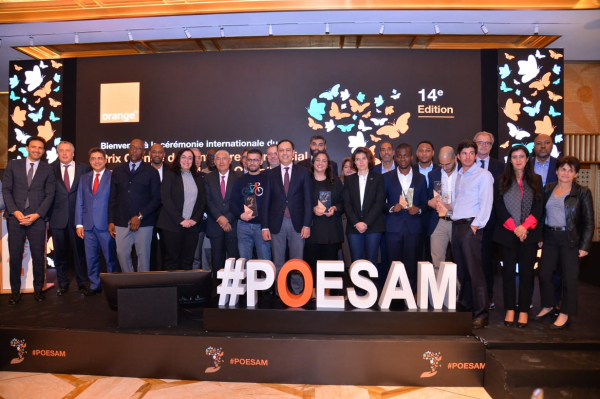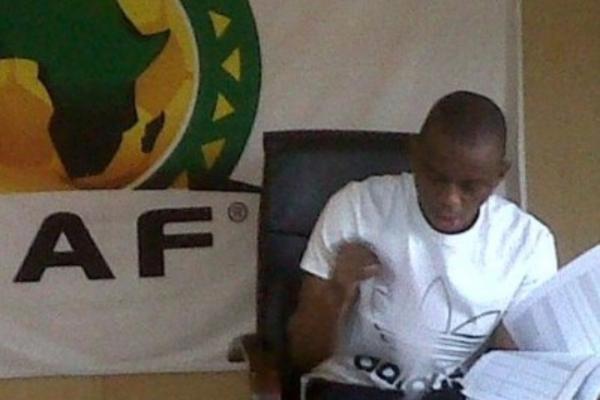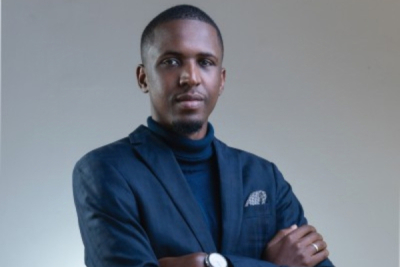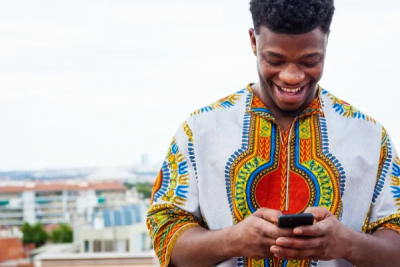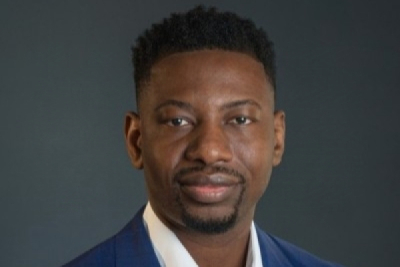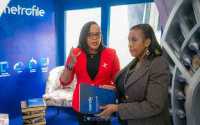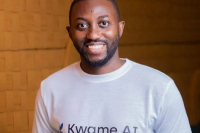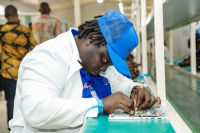African and Middle Eastern entrepreneurs with innovative projects are being celebrated for solutions that blend social impact with digital transformation. By showcasing these startups, the Orange Social Entrepreneur Prize highlights ingenuity aimed at addressing regional challenges.
The top international winners of the Orange Social Venture Prize in Africa and the Middle East (OSVP/POESAM) have been announced. Moroccan startup SAVEY, Tunisia’s WeFix, and Côte d'Ivoire's Cocoa Shield were officially presented to the public on Tuesday, November 12, during an international ceremony held in Casablanca, Morocco.
According to an Orange press release, these winners were selected from a pool of 1,600 applicants from 17 countries. The awarded projects in this 14th edition of OSVP cover diverse fields, including education, health, e-commerce, agriculture, and environmental protection.
The Grand Prize was awarded to Moroccan startup SAVEY, which offers a digital and logistical solution to reduce food waste by selling unsold or near-expiry food items. This solution earned them €25,000 in funding.
The second prize went to Tunisian startup WeFix, which provides a digital solution to support individuals and companies in the sustainable management of electronic and household appliances. This start-up received €15,000 in funding.
In third place was Ivorian startup Cocoa Shield, which uses AI and IoT to monitor and track cocoa crops, helping to combat crop diseases. This start-up was awarded €10,000.
The International Women’s Prize, celebrating a female-led startup with significant impact, was awarded to MyTindy (Morocco), an online platform connecting artisans with international customers to facilitate direct and independent sales. This platform received €20,000 in funding.
Finally, the "Coup de Cœur" prize went to Intella, an Egyptian start-up developing a multi-dialect Arabic speech-to-text transcription engine, one of the most accurate in the world, aimed at bridging the gap between AI advancements and the Arab-speaking world.
In addition to these awards, the national winners of POESAM 2024 from Orange’s 17 markets in the Middle East and Africa will receive support from Orange Digital Centers. This support will help them expand their businesses beyond national borders through a network active in Africa, the Middle East, and Europe.
Samira Njoya
After a few years in finance, he turned his attention to entrepreneurship. Leveraging technology, he developed innovative solutions in finance, logistics, and event management.
David Christian Mbang (photo) is a Cameroonian accountant by training and the founder and CEO of Adwa Sarl, a software development startup. Established in 2017, Adwa Sarl supports businesses in their digital transformation, offering IT audit and consulting services. The company designs custom technology solutions tailored to the needs of both businesses and individuals, guiding them through their digital projects.
One of its flagship products is AdwaPay, an online payment platform that enables businesses and e-commerce sites to manage financial transactions. AdwaPay supports payments through Orange Money, PayPal, Express Union, and various credit cards.
The startup also offers a range of other solutions, including Kwanza, a multichannel e-ticketing system, and Kiwoti, a web and mobile platform for ticket sales. Additionally, MyEvent, a platform dedicated to event promotion and ticket sales, is part of Adwa Sarl’s offerings. The company rounds out its service lineup with Mboa Taxi, a chauffeured vehicle reservation service providing air-conditioned cars for urban and intercity travel.
David Christian Mbang holds a master’s degree in finance and accounting, earned in 2012 from the University of Douala. Before founding Adwa Sarl, he served as Administrative and Financial Director at NG Conseil Sarl, a consulting firm operating in Congo and Cameroon, from 2016 to 2017.
Melchior Koba
Energy efficiency and smart resource management are top priorities for businesses. In Senegal, he leverages technology to meet these needs by delivering innovative solutions.
Bassirou Ba (photo) is a Senegalese tech entrepreneur and the founder and CEO of Witniss IoT, a startup specializing in fleet and fuel management. Witniss IoT aims to transform business operations by harnessing the power of the Internet of Things (IoT). The company addresses the need for monitoring and optimizing mobile assets through two main solutions: iGeoTrack and Fuel-Route.
The startup’s flagship product, iGeoTrack, enables companies to track the real-time location of their vehicles and monitor fuel consumption. By installing submerged fuel sensors, this technology boosts energy efficiency and reduces operating costs.
Additionally, Witniss IoT offers predictive maintenance services, along with driver identification and management systems. The company is also expanding its focus to include smart home solutions, temperature management for cold storage, and promotes the recycling of electronic and tech equipment.
Bassirou Ba graduated from the Institut Supérieur de Management in Senegal, earning a master’s degree in international management in 2018. After completing his studies, he worked as a business engineer for Group I.C.R., an IT and industrial engineering company, from 2018 to 2022. He then served as the B2B sales manager at Huawei in Senegal from 2022 to 2023.
Melchior Koba
Mobile internet access in Africa is evolving rapidly, yet speed disparities persist. While some countries report strong connection speeds, others struggle to keep up due to infrastructure and technological challenges.
South Africa leads the African continent in terms of mobile download speeds, averaging 34.5 Mbps, according to a report published, on Monday, by mobile data analytics firm Opensignal. This speed is 50% faster than that of Zimbabwe, which ranks second, and four times faster than Angola, which is at the bottom of the list.
Titled The State of Mobile Network Experience in Africa, the report covers 27 African countries and attributes these disparities to differences in network infrastructure investments and spectrum management. In South Africa, sustained efforts to modernize infrastructure and the rapid adoption of 4G and 5G technologies have enabled faster, more reliable connectivity. Conversely, Angola remains reliant on older technologies like 2G, which limit speeds and hinder the use of modern applications—a challenge also affecting countries like Zimbabwe and Mali, where infrastructure still needs significant upgrades.
In terms of Consistent Quality (CQ), a measure of the stability needed for services like video calls, South Africa and Tunisia perform well, with CQ scores of 58.6% and 57.6%, respectively. However, in over half of the African countries analyzed, CQ scores fall below 30%, indicating unstable connectivity that limits user experience, especially in countries like Mali, Guinea, and Cameroon.
To address these gaps, Opensignal suggests governments should invest in infrastructure, ensure efficient spectrum allocation, create supportive regulatory frameworks, enhance digital skills, address device affordability, and promote wider adoption of 4G and 5G technologies.
According to the GSMA increased mobile internet use could add about $795 billion to Africa’s GDP between 2023 and 2030. This underscores the significant economic impact that enhanced connectivity could have across the continent.
Samira Njoya
Every year, many Africans move abroad in search of better opportunities. This Nigerian entrepreneur supports migrants like himself by enabling them to provide financial assistance to family members back home.
Emmanuel Ogbodo (photo) is a Nigerian computer scientist and entrepreneur based in the United Kingdom. He is the founder and CEO of OhentPay, a fintech startup specializing in international money transfers.
Founded in 2018, OhentPay is a UK-based money transfer platform serving individuals and businesses. It allows users to send and receive money easily and quickly, facilitating financial exchanges between friends, family and loved ones worldwide. The platform supports up to 40 currencies, offering competitive exchange rates.
OhentPay primarily targets the millions of Nigerians living abroad, making international transactions straightforward with fixed, transparent fees and no hidden charges. The company currently operates in over 190 countries, including Australia, Belgium, France, the United States, Canada, and Estonia.
Ogbodo graduated from the University of Greenwich in the UK with a bachelor’s degree in computer engineering in 2017. His career began in 2013 at Nigeria's National Information Technology Development Agency, where he worked as a programming instructor.
In 2015, he joined Facebook as a software engineer, then moved to Mobile Worker Plus, a software and technology company, in 2017, where he served as a software engineer and DevOps consultant. In 2018, he took on the role of full-stack developer at Gigaclear, a UK telecommunications company.
Melchior Koba
Many African smallholders face challenges transporting their crops to urban markets. Tech entrepreneurs are increasingly stepping up to address this issue.
Kilimo Fresh is a digital solution developed by a Tanzanian startup that enables consumers to buy fresh produce online while making it easier for farmers to sell their products. Based in Dar es Salaam, the startup was founded in 2018 by Baraka Chijenga.
To use the platform, customers must access the e-commerce website through a web browser. They can browse a wide range of fresh products, including grains, fruits, milk, and various types of flour. While initial purchases can be made without an account, registration is required to complete transactions.
Kilimo Fresh serves as an intermediary between farmers and consumers. "[...]Through its efficient distribution model, the company sources fresh produce directly from smallholder farmers, adds value through cleaning, sorting, and packaging, then delivers it to its customers' locations," the startup explains.
Beyond individual consumers, Kilimo Fresh also supplies small retailers daily. The startup launched this solution to reach a broader customer base and help combat food waste. Kilimo Fresh “offers farmers stable prices (20% higher than those offered by middlemen), direct market access for their crops, and reduced food waste through the use of cold chain and cold storage facilities.”
In October, Kilimo Fresh was selected to participate in Angel Fair Africa, a major tech business showcase. Earlier in the year, the company received the Digital Innovation in Agriculture Award at the Tanzania Digital Awards.
Adoni Conrad Quenum
Reliance on manual, paper-based records leads to unnecessary costs in today’s digital age. Digitization could save Africa millions, improve public resource allocation, reduce government operational costs, and cut retrieval times, boosting productivity and efficiency - especially in services requiring quick information access.
Information and records management company Metrofile Kenya has announced a partnership with the Kenya Association of Records Managers and Archivists (KARMA) to advance digital transformation in Kenya’s records management sector. This collaboration was launched at KARMA’s 8th annual conference, held from 4 to 8 November. It seeks to establish a secure, efficient, and digitally forward approach to managing records nationwide.
At the event, Metrofile Kenya Managing Director Jackline Mburu highlighted the importance of effective records management in building a digital economy. “With EverFiles, we’re ensuring data sovereignty and smooth access to vital information. This partnership will empower Kenyan businesses and government bodies to manage their digital assets with confidence,” she said.
Metrofile’s EverFiles platform, central to this partnership, offers innovative solutions aimed at streamlining record-keeping, enhancing productivity, and promoting data sovereignty. Together, Metrofile and KARMA are setting new standards for Kenya’s digital transformation journey in records management, reinforcing the country’s position as a leader in digitizing government services.
This collaboration will help Kenya address the financial and operational inefficiencies of outdated, paper-based systems. It aligns with Kenya Vision 2030 initiative, a national development blueprint aimed at transforming the country into an industrialized, middle-income economy by the year 2030. A major pillar of this vision is public sector reform, which includes the digitization of government services to enhance efficiency, transparency, and accessibility.
In July 2024, Mary Kerema, the Secretary for ICT, eGovernment, and the Digital Economy stated that the Kenyan government was aiming to digitize at least 80% of public services and make them accessible via the eCitizen platform. She pointed out that nearly 17,000 services had already been digitized and put online as part of the National Digitisation Plan (2022-2032).
Thanks to the accelerated digitization of public services, the President of the Republic, William Ruto, claimed in November 2023 that the State's monthly revenue had increased from around 1.5 billion shillings (11.7 million USD) in previous years to 9 billion shillings. This growth was due to many factors, including a reduction in the cost of managing paper documents.
Hikmatu Bilali
He is an award-winning entrepreneur with a proven track record in digital marketing and business. He has founded over five companies in various industries, including finance, mobility, and logistics.
Wilson Ganga (photo) is an Angolan serial entrepreneur and business leader. He is the founder and CEO of Paypay Africa, a fintech specializing in mobile payment solutions for e-commerce across Africa. His mission is to make financial services more inclusive and payments more convenient.
Launched in 2020, Paypay Africa offers a mobile app that enables users to send and receive money, pay electricity, water, and TV bills, buy airtime, and shop at various retailers. The startup also helps individuals and businesses save money by eliminating maintenance fees and providing discounts to its customers.
On its website, the company states its goal is to empower Angolans to make international transfers through Paypay and establish the app as the top payment solution in Angola.
In 2015, Ganga co-founded Tranzind Delivery, an online ordering and marketing company where he now serves on the advisory board. In 2016, he co-founded Tupuca, a delivery startup where he holds a board position. The following year, he launched G-Smart Solutions, a firm focused on digital business services.
Ganga also serves as CEO of G-Corporate, an investment company in Angola. In 2021, he co-founded Gafran International, a transport and logistics company, and in 2023, he launched Avança Na Vida, a microcredit startup. He is also on the board of the Angolan group Dinelia.
Ganga holds a bachelor’s degree in business administration with a concentration in management and operations from the University of Saint Francis in the United States, awarded in 2015. In 2018, he was named Entrepreneur of the Year at Deloitte's Sirius Awards.
Melchior Koba
A computer science graduate with a passion for artificial intelligence, he aims to make education more accessible in Africa. He has received numerous awards and honors for his achievements.
George Boateng (photo) is a Ghanaian computer scientist, engineer, educator, and social entrepreneur. He is the co-founder and CEO of Kwame AI, a tech startup focused on democratizing science and technology education in Africa.
Founded in 2022, Kwame AI (formerly SuaCode.ai) specializes in artificial intelligence. The company supports students, educators, researchers, and legal professionals in enhancing their performance and productivity. It offers EsqAI, an AI-powered legal assistant.
Accessible via a web app, EsqAI enables lawyers and law students in Commonwealth countries to conduct legal research. This assistant combines semantic search with generative AI to answer users’ questions instantly, leveraging its database and aggregated content.
Boateng is also a lecturer at ETH Zurich, a renowned Swiss university known for its expertise in science and technology. Before founding Kwame AI, he co-founded the Nsesa Foundation in 2014, a non-profit organization promoting innovation in Ghana, where he served as president until 2022. He graduated from Dartmouth College in the United States, where he earned a bachelor’s degree in computer science in 2016. He also holds a master’s in computer engineering from Dartmouth’s Thayer School of Engineering (2017) and a PhD in machine learning from ETH Zurich (2022).
In 2015, he interned as a software engineer at Sapho, a U.S.-based software company, and in 2021, he joined Amazon as an applied scientist. During his internship with the Alexa Edge ML team, he worked on multimodal sarcasm detection for Alexa AI.
His career has garnered significant recognition. In 2021, he was named among MIT Technology Review’s 35 Innovators Under 35. In 2022, he was listed as one of IBM’s “New Creators,” and in 2023, he was featured on Forbes’ 30 Under 30 list.
Melchior Koba
In today's digital age, access to technology is crucial for development. Initiatives that empower people with digital skills and tools are essential for creating a more inclusive and prosperous future.
On Sunday, November 10, Guinea’s Prime Minister Amadou Oury Bah inaugurated the country’s first laptop assembly unit in Mamou, located within the Higher Institute of Technology (IST). This project, launched in collaboration with the Ministry of Higher Education, Chinese company Green View, and local partner Guinea Technologie Innovation (GTI), marks a significant step toward positioning Guinea as a technological leader in West Africa.
"Guinea needs to be a player in technology. We must not only consume phones and laptops but also manufacture them. We have resources, a vision, and the responsibility to train the talent to bring this vision to life," said Prime Minister Bah.
The initiative is part of the “Simandou 2040” vision led by the transitional president, Mamadi Doumbouya, which aims to modernize and diversify Guinea’s economy. As part of this strategy, the government intends to transform Mamou into a regional tech hub, called “Mamou Valley,” where academic institutions and businesses will collaborate to drive innovation. Additional initiatives are underway, including the construction of regional universities, the establishment of a Science and Innovation City, and the redesign of technology training programs.
With 4.87 million internet users as of January 2024, according to DataReportal, and an internet penetration rate estimated by the government at 52% in May, Guinea has potential for further digital inclusion. However, the high cost of computers and smartphones remains a barrier. This laptop assembly project is expected to help lower these costs, making technology more accessible, while also boosting the digital job market and supporting national economic transformation.
Samira Njoya
More...
After gaining several years of experience in France, she returned to Africa to contribute to its development. She is passionate about promoting women's inclusion in the tech industry.
Longa Andrea Mbuyamba (photo), a Côte d'Ivoire-based digital transformation consultant based, is the founder of Abidjanaises In Tech, an organization focused on strengthening and promoting women’s participation in the digital sector in Côte d'Ivoire. Established in 2023, Abidjanaises In Tech aims to inspire, connect, and equip women with the skills needed to thrive in the technology field. Positioned as a business network, the organization aspires to build the largest pool of qualified female tech experts in the country.
"Our goal is to create opportunities, enhance digital skills, and spark interest in tech careers while raising awareness across our ecosystem. We reflect the diversity and dynamism of women from all backgrounds in the STEM universe [science, technology, engineering, and mathematics] and work with determination toward a more inclusive, balanced digital future," the organization explains.
Abidjanaises In Tech hosts workshops, experience-sharing sessions, and mentoring programs to develop both technical and leadership skills among its members. It also highlights members' achievements on its communication platforms. Currently, the organization has over 280 members, including 38% professionals and 31% entrepreneurs and startup founders. In its first year, it generated more than fifty opportunities for its members.
Before founding Abidjanaises In Tech, Mbuyamba co-founded Panafrican Stories in 2018, a platform aimed at strengthening connections between Africa and its diaspora by sharing stories and insights on the continent.
Mbuyamba holds a State Certificate in Political Studies, specializing in economic intelligence, earned from Sciences Po Aix in France in 2014. She also obtained a Master’s in Management Science from IESEG School of Management in 2017.
Her professional journey began in 2014 as an account manager assistant at South African PR firm Amplicon PR. In 2017, she interned as a marketing assistant before advancing to project manager at Deloitte France. She later joined Accenture France in 2018 as a digital transformation consultant. From 2021 to 2023, she served as Head of Organization and Change Management for financial institution COFINA Group.
Melchior Koba
With rapidly evolving communication and delivery methods, modernizing postal services in Africa has become a necessity. Postal services must adapt to meet the changing needs of society, integrating digital solutions to stay relevant and effective in a fast-paced environment.
Burkina Faso introduced, on Tuesday, November 5th, new digita solutions aimed at enhancing postal and financial services. Presented by Minister of Digital Transition, Posts, and Electronic Communications, Aminata Zerbo/Sabane (photo), they include Poste Money, a mobile app that enables users to send and receive money, make merchant payments, and manage accounts. Poste Money includes a semi-offline feature to support areas with limited connectivity.
The government also presented Cashless PDI, an application designed to ensure the secure and transparent distribution of aid funds directly to internally displaced persons (IDPs).
To improve core postal services, La Poste has introduced DBOX (Delivery Box), an automated mail distribution system that addresses the rising demand for fast, secure postal services. Additionally, self-service deposit machines will be installed, allowing customers to deposit funds independently.
Future projects include the launch of a Postal Electronic Messaging Box (BMEP) for professional and personal digital exchanges, and Poste Mobile, which aims to extend financial services to rural and remote areas.
These initiatives align with Burkina Faso’s national digitalization plan and the Universal Postal Union (UPU) guidelines, as the country seeks to modernize its postal services. The UPU’s 2023 Integrated Index for Postal Development (2IPD) currently rates Burkina Faso’s postal development at only two out of ten, underscoring the need for urgent modernization.
Samira Njoya
Digital technologies can revolutionize African agriculture. The adoption of innovative technologies can boost productivity and enhance the competitiveness of farmers across the continent.
Access to technology, combined with tools such as big data, GPS, and drones, could increase crop yields in Africa by 10.5% to 20% over the next five years, the GSM Association (GSMA) projects. In its May 2024 report, Driving Digital Transformation of African Economies, the organization also predicts that expanding ICT usage in African agriculture could lead to a 23% increase in profits over the same period. GSMA emphasizes the need for African governments to make smart digital investments, as these could drive growth across several strategic economic sectors.
Agriculture remains a critical engine for growth and employment in Africa. Recent advancements are already delivering more efficient services to farmers. “For example, Aerobotics in South Africa provides data analytics and machine learning to process aerial imagery from drones and satellites, providing realtime insights on crop performance, pests, plant health, irrigation levels,” the report details.
Even simpler digital tools can enhance agricultural supply chain efficiency through better access to information and training. “SMS messages to smallholder sugarcane farmers about when to perform specific agricultural tasks was found to increase yields by 11.5%,” GSMA notes.
Additionally, technology is enhancing market access for farmers through new models of aggregation, logistics, and supply chain management. In Ethiopia, for instance, the Ethiopian Commodity Exchange now differentiates coffee quality more effectively, and its traceability technology allows small farmers to connect directly with global buyers.
Agriculture is essential to Africa’s economic growth and food security, and international organizations, including the United Nations, are calling for its digital transformation to improve product quality and yields. This interest has spurred continuous investment in agritech startups over the past five years, despite the 2023 funding crunch. According to Briter Bridges’ State of AgTech Investment in Africa 2024 report, the agricultural sector accounted for 13% of total funding and 5% of all fundraising deals in 2020. While this dropped to 6% of both funding and deal volume in 2023, Oxford Business Group’s Agriculture in Africa 2023, in partnership with OCP Group, forecasts a promising annual growth rate of 44% in African agritech from 2023 to 2028.
For African farmers to fully benefit from digital transformation, however, expanding network coverage, increasing access to mobile devices, and making internet access affordable are crucial. Addressing these issues could integrate more farmers into the digital economy. According to GSMA’s The State of Mobile Internet Connectivity 2024 report, boosting mobile internet use could add $795 billion to Africa’s GDP between 2023 and 2030.
Samira Njoya
Born in Nairobi to help residents save money, it now plans to expand to several other countries in the coming months.
Chumz is a fintech solution developed by a Kenyan startup, enabling users to save and invest money. Founded in 2019 by Samuel Njuguna, this Nairobi-based startup offers a mobile app available on iOS and Android, which has already been downloaded over 100,000 times, according to Play Store data. After downloading the app, users can create an account to access Chumz's services, set personal or group savings and investment goals, and take action toward them as soon as possible.
The app allows users to add friends or family members to create joint savings or investment goals. Chumz enables users to save with as little as 5 Kenyan shillings (about $0.04). Through the app, users can track their savings progress and receive periodic reports on their financial growth. They are also reminded to save through behavior-based notifications and deposit prompts.
“For example, if a user spends money at a pub, the app suggests investing a portion of that money instead of spending it all. Similarly, when a user receives mobile money, the app prompts them to save some of it. Chumz provides an easy and convenient way for users to save and invest, helping them reach their financial goals,” explains Samuel Njuguna.
After surpassing 200,000 users, Chumz now eyes the Rwandan market, with Tanzania, Uganda, and Botswana also on its growth agenda in the coming months. By 2026, Chumz aims to reach one million users in Kenya, its home market.
Adoni Conrad Quenum


